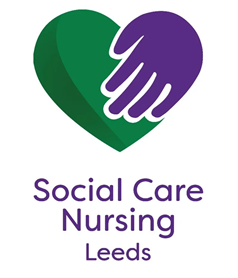Leeds City Council and partners across the city are committed to supporting nurses to work in care homes and social care settings. This project aims to involve care homes and social care providers in future nursing development and to invite staff to share their experiences.

We also hope to raise awareness of career development opportunities available across the care sector for trained nurses, spanning a variety of care settings including residential care, mental health services and substance misuse services.
In collaboration with local universities and care providers, we’ll set up a network of nurse champions to offer mentoring opportunities and placements in care provision for trainee nurses.
Leeds: the place to be

Leeds is the UK’s fourth largest city and is a diverse and multicultural centre. The city has the largest number of universities outside of London and is known for its world class shopping and culture. Leeds is also just a stone’s throw away from some the world’s most beautiful Yorkshire landscapes and countryside. The wider Leeds City Region is seen as the UK’s leading centre for healthcare and innovation, and an international leader in commissioning and delivering integrated health and social care services. With four out of the five NHS national offices based in Leeds, including NHS England, Leeds has an exceptionally strong healthcare sector focus.
Together, Leeds health and care partners are working together to make Leeds the best city for health and wellbeing.
Leeds City Council and partners across the city are committed to supporting nurses to work in care homes and social care settings.
Care home and social care nursing is an extremely rewarding career, offering a great deal of development and training, with clear opportunities for progression. Be part of the city’s Covid-19 Recovery.
In-house nursing staff build long-term relationships with residents and gain experience of treating patients with a variety of health conditions and using a strength-based approach.
This project aims to involve care homes and social care settings in future nursing development and to invite staff to share their experiences. We are keen to develop a community of practice between community-based nurses to:
- Share learning
- Share experience
- Make connections
- Support each other
Nurses will gain closer working relationships across the nurse community in their area, a forum to share good practice, specific skill sharing sessions, plus educational talks and training.
Student placements

Why you should get involved
There are so many benefits to providing clinical placements to our learners – our future healthcare workforce. The Skills for Care Website has lots of invaluable information, including a guide on how to make the most of student nurse placements. Click here to find out more.
Current issues and opportunities for the Social Care Sector:
- to address the national shortage of Nurses, Universities are increasing their intake of undergraduate Student Nurses. 50% of the course is spent practice-facing and so more clinical placements are needed to enable them to complete their training.
- The social care sector needs to work to attract and retain the right people. Providing clinical placements means you are exposing the future workforce to the career opportunities within your setting.
- People are living longer and with more complex health needs that are met within the community. The Future Nurse Proficiencies require students to experience this breadth of learning, which social care settings are well placed to provide.
A solution
Becoming a placement provider in a social care setting will:
- contribute to the learning and development of our future workforce.
- provide essential and unique learning opportunities to our healthcare learners that they cannot get in other settings. They will learn from experienced practitioners how to work with people on their own terms, in their own living environments.
- promote social care as a rewarding and fulfilling career. Students often apply to work in areas they have experienced on placement.
The benefits
- Service users have positively evaluated their experiences of having learners engage with them. They appreciate an extra friendly face and there being more staff available.
- Students have access to the impressive library facilities at the Universities, granting them access to the most up to date literature.
How to get involved
Practice Learning Facilitators and University Liaison Lecturers provide support to clinical placements and their teams.
If you would like to become a placement provider we can support you in the process, including sign-posting to free training that is available for your team to access so they are prepared to support students.
For further information please get in touch.
Testimonials
Danielle Miller, Patient Safety and Quality Improvement Practitioner: My story

Nursing in social care is so rewarding. You get to see more of a person’s journey over a longer period of time. The focus is not only on the condition, illness or disease or just trying to get them better. It’s also about knowing their likes and dislikes, as well as getting to know their personality, wishes and their relationships with families and friends. Initially, it was the location of the care home that brought me to social care nursing. When I first visited, I liked the homely environment but once I started working this, wasn’t why I stayed. My passion for caring for older people that I always had, began to grow and I loved to hear stories about their lives and their memories. Those within the home had achieved so much and experienced so many different things in their lives. I wanted to be a part of supporting them to have the best quality of life throughout their older age. It is a hard decision for families to send a loved one or for an individual to agree to leave their home and move into a new home. I knew that working in this sector would help change attitudes and thoughts about social care and make families and individuals feel more at ease when they moved into the care home. In my opinion that was me making my difference.
I was shocked when I visited a nursing home, as it was not what I expected. It seemed homely. Activities were taking place. Residents were chatting away and staff were joining in. The longer I worked in social care, I realised that no two days were the same. I worked with great teams of care staff who were very knowledgeable, who knew the residents and were very supportive. The residents had such diverse cultures, needs, wants, clinical and social needs. In the care home, I did not feel like I worked in a specialist area but felt empowered in learning more about all contributions to a resident’s care, such as completing moving and handling assessments and learning about various health conditions.
I built many positive relationships with residents and their families. When you are in a resident’s home (care home), you meet all the different members of their family if they visit and for those who don’t have family you become like their family. When your shift finishes, you’re likely to see the resident when you return, which helps with building a therapeutic relationship. You are there for their highs and lows, it’s not just about their health needs but you’re there to support their social needs too.
Once I started working in social care, I could regularly see the career opportunities available such as clinical lead, deputy manager, home manager and regional manager. Social care opens a lot of doors to opportunities, which I would not have been aware of if I hadn’t started working in that sector. There are also a lot of development opportunities as a qualified adult nurse. All my training was focused on adult nursing but in social care, I got the opportunity to learn about mental health too.
Working in social care empowered me as a nurse and helped me learn about various conditions and assessments such as moving and handling equipment, assessments of mobility and responding to emergencies. There are also a lot more development opportunities available than in other roles I’ve had, which usually only senior staff members or specialist teams were able to access. Skills like completing audits, supervisions and moving and handling assessments for equipment. These are good opportunities to learn transferable skills in a supportive environment.
I had heard a few negative assumptions about the care sector and they were all wrong. It’s just not true that you de-skill and that people only work there at the end of their career. My advice to anyone considering a role in nursing is to not limit themselves. Look for opportunities outside the usual pathways and don’t let negative assumptions impact your journey.
Nurse champions
Why don’t you think about becoming a social care nurse champion in Leeds, to promote the work you do as well as the great career prospects?
Do you work in a care home or social care setting as a nurse? Would you like to share your experience and encourage others to work in the sector?
So, what does it mean?
The role of a champion in health and social care is an essential one. Being a social care nurse champion will ensure that local services continue to improve, which is key to facilitating the changes that will improve the standard of living of those who benefit from them.
Nurse champions encourage others who have not yet considered pursuing a nursing career within the sector by sharing positive examples of their own and in turn, help in raising the general profile of social care nursing.
In raising the profile of nursing in the sector, nurse champions are doing their bit to improve the flow of nursing talent through health and social care services in their local area and this will reflect in the quality of care that will be delivered across the various care settings.
We’re looking for nurse champions to support trainee nurses and engage with those who may not yet be aware of how much of a rewarding and exciting career awaits them within health and social care in Leeds.
For further information please get in touch.
Training and Learning opportunities
Lead to Succeed
This programme will support delegates to further develop their leadership and management potential through understanding how successful behaviour and practical strategies can support them in their day to day work, as well as considering how they could implement these, now and in the future.
Well-Led
The programme is grounded in the reality of social care delivery and has been developed in partnership with registered managers familiar with the day-to-day challenges of leading a care team. It is made up of a series of practical workshops, the programme is designed to enable leaders to deliver care and support services in line with expectations of a well-led service.
ACAS Essential Line Manager Skills
The series of ACAS courses can either be taken as standalone courses, both full days and half days, or as a complete modular programme, delivered over five days.
The programme will cover, as required:
- Learn to communicate effectively
- What does a good boss look like?
- Be a leader and delegate responsibly
- Motivate your people
- Deal with issues – have difficult conversations!
- Discipline and Grievance
- Increase performance and productivity
- Deal with absence
For more information relating to the above training courses or for other training related opportunities within the health and social care sector in Leeds, please get in touch.
Contact us
Student placements
Email: placements@healthcare.leeds.ac.uk
Nurse Champions
Email: asc.od@leeds.gov.uk
Training and learning opportunities
Email: asc.od@leeds.gov.uk
